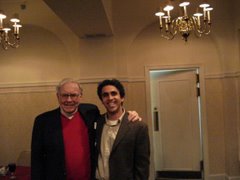Here's Motley Fool contributor Emil Lee's second half of his interview with superinvestor Mohnish Pabrai. Click http://shamgad.blogspot.com/2007/02/mohnish-pabrais-perspectives-on.html for Part 1.
Emil Lee: How do you do your due diligence? Do you generally stick to industries you are already familiar with? How in-depth do you get, in terms of studying a company, its industry, and its competitors? Do you talk to a lot of people in the industry?
Mohnish Pabrai: I don't call or meet with management or company insiders. I do rely, from time to time, on the investors in Pabrai Funds. I am blessed to have a large contingent of CEOs and entrepreneurs as investors. Many of these folks know their industry cold. So, if I'm looking at something in real estate, there are [a] few real estate experts in my circle. I read up on the business, try to honestly assess whether it is within my circle of competence, and then send my thesis to the investors with domain knowledge and get their perspective.
Lee: You don't use Excel models. How do you keep track of all the moving parts (i.e. unit costs, discounted cash flow)? Are the economics of your investment ideas so compelling/simplistic that they can be done on the back of an envelope?
Pabrai: Usually two to three variables control most of the outcome. The rest is noise. If you can handicap how those key variables are approximately likely to play out, then you have a basis to do something. Things that are approximate and probabilistic don't lend themselves too well to Excel modeling. For me, if I find myself reaching for Excel, it is a very strong sign to take a pass. The thesis ought to be painfully simple in your head.
Lee: There's a ton of books about value investing, but very few about "special situation" or "event driven" investments -- do you recommend any books/magazines? Do you recommend any other business publications/trade magazines? Also, you mentioned Timothy Rick in Altucher's book -- I couldn't find anything on him (was it supposed to be Timothy Vick?) -- can you point me in the right direction?
Pabrai: Yes, it's Tim Vick. Buffett has spoken and written a lot about special situations. One should read up on the Buffett Partnership letters and Shareholder letters, as well as the annual meeting transcripts printed in OID. Tim talks about it in his book as well. Finova was a recent Buffett Special Situation, as were his adventures with Level 3 (Nasdaq: LVLT) Bonds, Korean stocks, American Express (NYSE: AXP) in the 1960s, etc.
Lee: What do you hope to accomplish with your new book? Is there a message or point you'd like readers to pay particular attention to?
Pabrai: The best way to learn is to teach. Writing the book was tremendously helpful for me to systematize the framework that I had in my head. I enjoyed writing it. I wrote it for the intelligent individual investor. And I wrote it for the great-grandkids that I'll probably never meet. If it improves the investing results of a few humans, I'd consider it a success.
Lee: Do you have any additional advice that would be helpful to people like me, who are trying to learn as much as possible about investing?
Pabrai: Pursue your passion, whatever it is. If you pursue what you love, you're pretty much assured of doing well at it. If investing is your passion, then study the best intently. The best investor is Warren Buffett and he's an open book. I'd suggest spending all one's energies getting to understand Buffett's modus operandi. To the extent that it's consistent with your temperament, adopt it.
Monday, February 26, 2007
Subscribe to:
Post Comments (Atom)


3 comments:
This is the first time I've read about Mohnish Pabrai. The points he makes are very good ones and expressed sucinctly: The sign of a very bright and capable person. I'll study him some more.
he's an excellent investor...a true Graham style money manager.
Interesting blog...I have one related to investing as well
http://marketprognosticator.blogspot.com/
Post a Comment